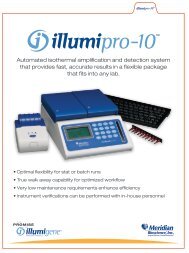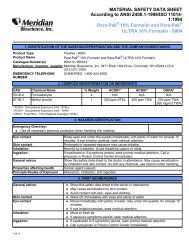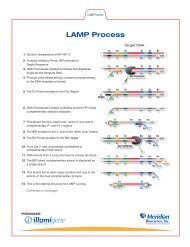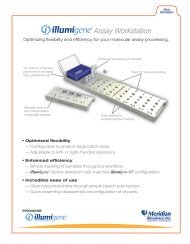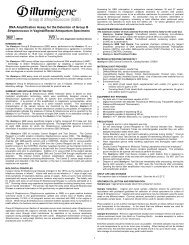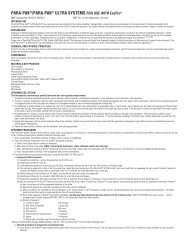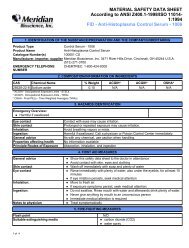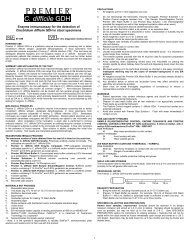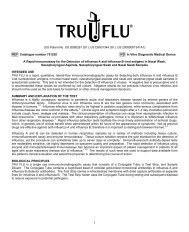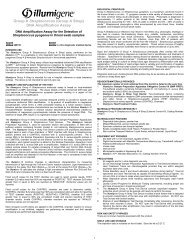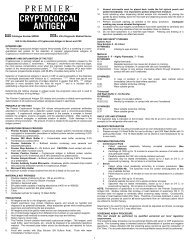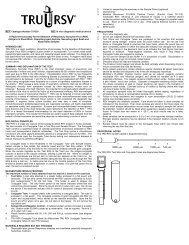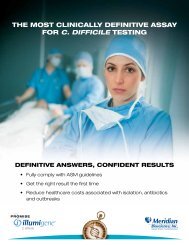GBS Answers - Meridian Bioscience, Inc.
GBS Answers - Meridian Bioscience, Inc.
GBS Answers - Meridian Bioscience, Inc.
Create successful ePaper yourself
Turn your PDF publications into a flip-book with our unique Google optimized e-Paper software.
<strong>GBS</strong><strong>Answers</strong><br />
A Host of<br />
Complications<br />
At 40 weeks, Mikos’ doctor induced<br />
labor. After 30 hours of labor, the baby’s<br />
heart rate plummeted and Mikos had<br />
to have an emergency C-section.<br />
“I only remember that when Anthony<br />
was born, I heard nothing — no<br />
crying, nothing. Then I passed out.”<br />
When she came to in recovery, her<br />
fiancé told her that the baby was in<br />
neonatal intensive care with major<br />
complications.<br />
As Mikos later learned, Anthony had<br />
many problems, including pneumonia,<br />
meconium aspiration syndrome,<br />
severe edema, and respiratory<br />
distress because the umbilical cord<br />
had been wrapped around his neck.<br />
But the most serious of the complications<br />
was <strong>GBS</strong>. Even though the <strong>GBS</strong><br />
screening test had come back negative,<br />
blood tests after he was born<br />
found <strong>GBS</strong> in little Anthony’s blood.<br />
Because of the many serious problems<br />
Anthony was dealing with,<br />
Mikos was told that if he lived, he<br />
might have brain damage, blindness<br />
or hearing loss.<br />
Anthony spent 17 excruciating days<br />
in NICU, but he survived. Now, almost<br />
two years later, he is a happy, healthy,<br />
perfectly normal toddler — no blindness,<br />
no hearing loss, no neurological<br />
problems. Excellent neonatal care<br />
and a lot of luck saved Anthony. But<br />
the screening test intended to prevent<br />
his ordeal did not.<br />
Be a Partner<br />
There is no way of knowing whether<br />
the membrane sweep introduced<br />
the bacteria after the negative <strong>GBS</strong><br />
test or if the test itself was faulty or<br />
perhaps misread. No medical test<br />
How to Help Protect<br />
Your Baby, Before and<br />
During Labor<br />
In addition to adhering to the<br />
CDC’s early-onset prevention<br />
strategy, Moms can take additional<br />
precautions to help protect<br />
their babies from Group B Strep.<br />
The two pillars of the Centers<br />
for Disease Control and Prevention’s<br />
recommendation to protect<br />
against early-onset <strong>GBS</strong> are to test<br />
all women during week 35 – 37 of<br />
In addition to asking your<br />
doctor about your <strong>GBS</strong> test,<br />
you should:<br />
• See your provider promptly<br />
for any symptoms of vaginal<br />
infection. Get a copy of all test<br />
results and keep them with you.<br />
• Take caution regarding<br />
invasive procedures.<br />
• Discuss the benefits vs.<br />
risks of possible methods of<br />
induction with your provider<br />
early in pregnancy as not all<br />
providers ask before “stripping”<br />
membranes.<br />
is 100 percent reliable and there are<br />
many ways to contract an infection.<br />
But there is a lot moms can do to<br />
improve the odds that their babies<br />
will be born healthy and stay healthy.<br />
“I know doctors get tired of patients<br />
coming in with information they’ve<br />
read on the Internet,” Mikos says.<br />
their pregnancy, and to administer<br />
antibiotics during labor to those<br />
who test positive.<br />
For the test, a swab will be used<br />
to collect a sample. According<br />
to CDC, about 25 percent of<br />
pregnant women are carriers of<br />
the bacteria and should be treated<br />
during delivery. Ask your doctor<br />
for illumigene ® <strong>GBS</strong>.<br />
• If you are having a planned<br />
C-section, talk to your provider<br />
about the risks vs. benefits of<br />
starting IV antibiotics well before<br />
your incision. C-sections may<br />
not completely prevent <strong>GBS</strong> infection,<br />
although the risk during<br />
a planned C-section is extremely<br />
low if performed before your<br />
labor starts/water breaks.<br />
The CDC says pregnant women<br />
who test positive or have had a<br />
previous infant with <strong>GBS</strong> should<br />
receive antibiotics through the vein<br />
during labor. This method is only<br />
effective during labor because the<br />
bacteria can grow back quickly.<br />
But she still recommends being an<br />
outspoken partner with your health<br />
care providers. Ask questions, get<br />
answers and do your homework. The<br />
more you know and the more input<br />
you provide, the better your chances<br />
of a happy outcome like the one Anthony<br />
and his parents enjoy.<br />
9



